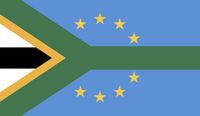Westzeeland: Difference between revisions
Westzeeland (talk | contribs) No edit summary |
Westzeeland (talk | contribs) No edit summary |
||
| Line 132: | Line 132: | ||
Westzeeland, or formerly the republic of Westzeeland, is a constitutional republic located on the shores of South America. The nation has a population of 42 million, a mijority of whom are of african ancestry. Westzeeland is a multiethnic society encompassing a wide variety of cultures, languages, and religions. Its pluralistic makeup is reflected in the constitution's recognition of 11 official languages, which is one of the highest numbers in the world Two of these languages are of European origin: Afrikaans developed from Dutch and serves as the first language of most coloured and white Westzeelanders; English reflects the legacy of colonialism, and is commonly used in public and commercial life, though it is the second most common spoken first language. The country is one of the few in South America never to have had a coup d'état, and regular elections have been held for almost a century. However, the vast majority of black Westzeelanders were not given the right to vote until 2009, and still lack many rights in social and economic life. During the 20th century, the black majority sought to claim more rights from the dominant white minority, with this struggle playing a large role in the country's recent history and politics. The | Westzeeland, or formerly the republic of Westzeeland, is a constitutional republic located on the shores of South America. The nation has a population of 42 million, a mijority of whom are of african ancestry. Westzeeland is a multiethnic society encompassing a wide variety of cultures, languages, and religions. Its pluralistic makeup is reflected in the constitution's recognition of 11 official languages, which is one of the highest numbers in the world Two of these languages are of European origin: Afrikaans developed from Dutch and serves as the first language of most coloured and white Westzeelanders; English reflects the legacy of colonialism, and is commonly used in public and commercial life, though it is the second most common spoken first language. The country is one of the few in South America never to have had a coup d'état, and regular elections have been held for almost a century. However, the vast majority of black Westzeelanders were not given the right to vote until 2009, and still lack many rights in social and economic life. During the 20th century, the black majority sought to claim more rights from the dominant white minority, with this struggle playing a large role in the country's recent history and politics. The white-controlled government imposed apartheid in 1946, institutionalising previous racial segregation. After a long and sometimes violent struggle by the Coloured Freedom Group (CFG) and other anti-apartheid activists both inside and outside the country, the repeal of discriminatory laws began in the mid-1990s, but many discriminatory laws are still enforced. | ||
Revision as of 19:18, 7 February 2020
The Republic of Westzeeland Agaxuxe Aguxe | |
|---|---|
|
Flag | |
| Anthem: Arise people of Westzeeland | |
| Capital | Retoria |
| Official languages | English, Aguxe, Dutch, Afrikaans |
| Ethnic groups (2018) | 49% Black 31% Native 9% Biracial 8.5% White 3.5% Asian |
| Government | |
• President | Robert Goldschmeding |
• Prime Minister | David Yohannesburg |
| Legislature | Congress |
| Senate | |
| House of State Representatives | |
| Establishment | |
• Self-Governance | 1911 |
• Dominion | 1926 |
• Republic | 1942 |
| Population | |
• 2018 estimate | 42,545,000 |
| Gini (2019) | 69 very high |
| HDI | high |
| Currency | Reat (RET) |
| Driving side | left |
Westzeeland, or formerly the republic of Westzeeland, is a constitutional republic located on the shores of South America. The nation has a population of 42 million, a mijority of whom are of african ancestry. Westzeeland is a multiethnic society encompassing a wide variety of cultures, languages, and religions. Its pluralistic makeup is reflected in the constitution's recognition of 11 official languages, which is one of the highest numbers in the world Two of these languages are of European origin: Afrikaans developed from Dutch and serves as the first language of most coloured and white Westzeelanders; English reflects the legacy of colonialism, and is commonly used in public and commercial life, though it is the second most common spoken first language. The country is one of the few in South America never to have had a coup d'état, and regular elections have been held for almost a century. However, the vast majority of black Westzeelanders were not given the right to vote until 2009, and still lack many rights in social and economic life. During the 20th century, the black majority sought to claim more rights from the dominant white minority, with this struggle playing a large role in the country's recent history and politics. The white-controlled government imposed apartheid in 1946, institutionalising previous racial segregation. After a long and sometimes violent struggle by the Coloured Freedom Group (CFG) and other anti-apartheid activists both inside and outside the country, the repeal of discriminatory laws began in the mid-1990s, but many discriminatory laws are still enforced.
